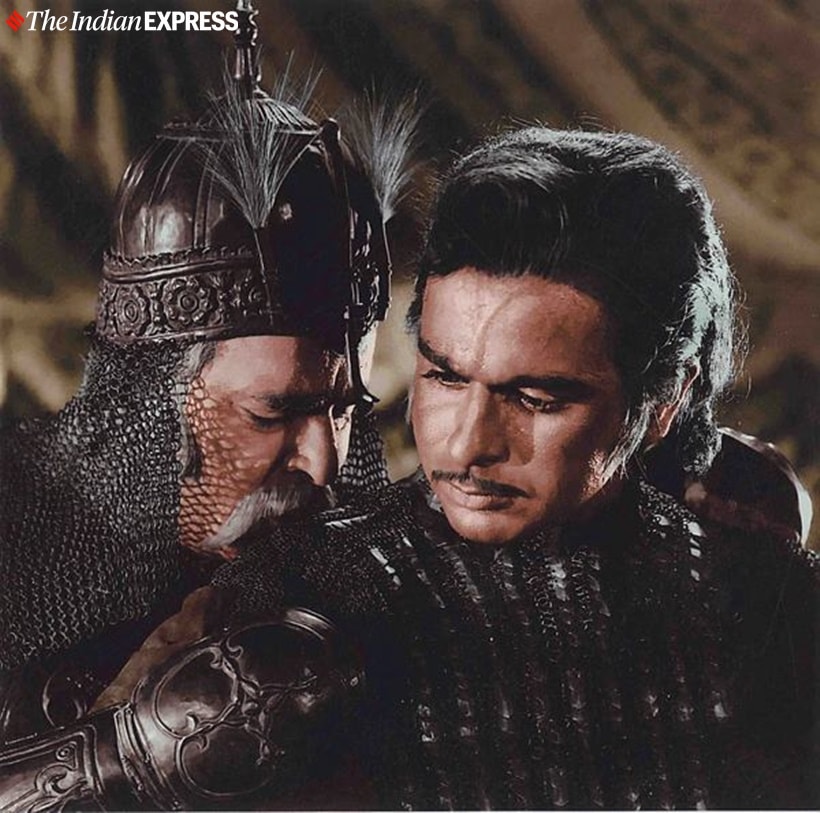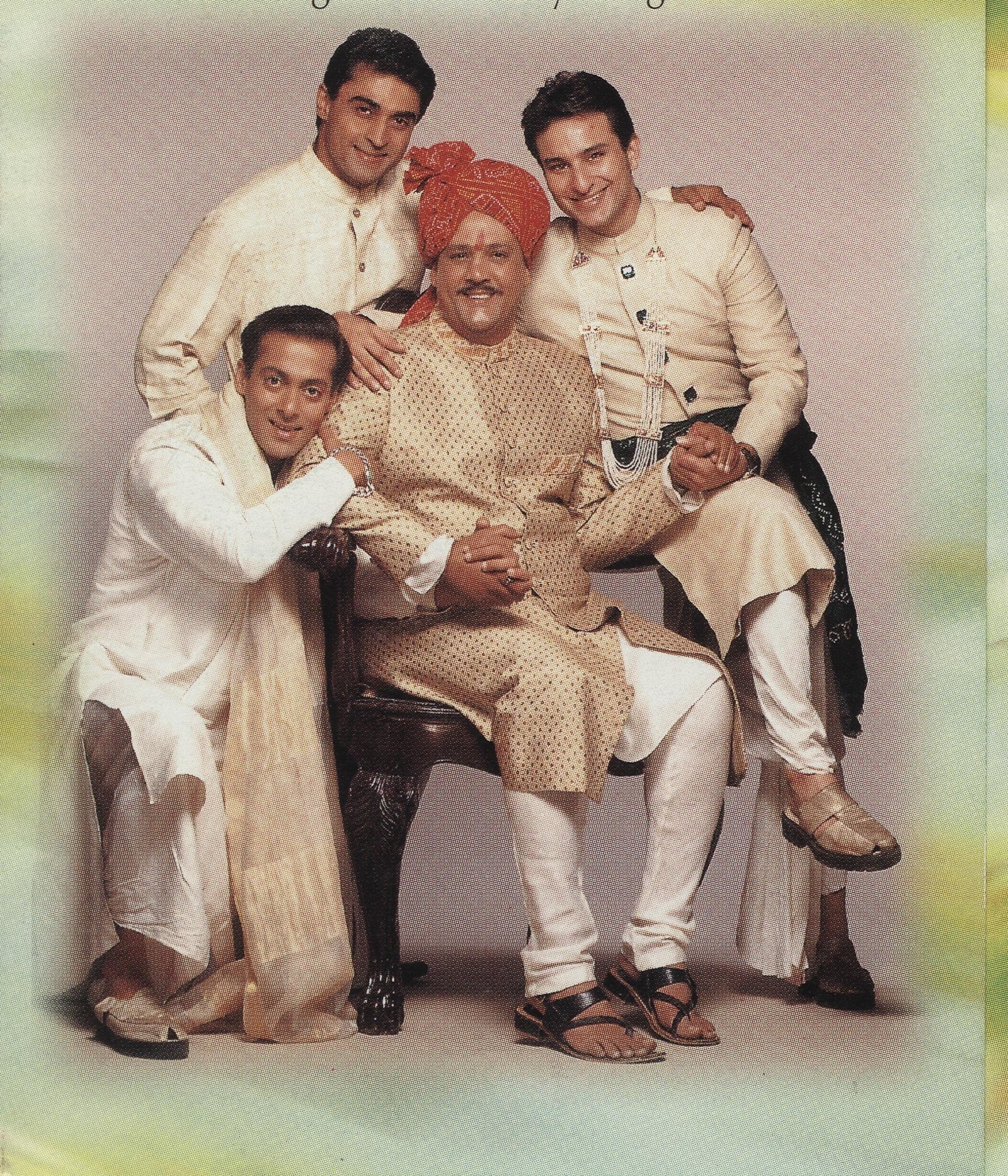From The Mehta Boys to Mughal-E-Azam and Animal: Fathers and sons who are foes, friends and everything in between (original) (raw)
I enjoyed watching The Mehta Boys last week on Amazon Prime Video. As impressive as Boman Irani and Avinash Tiwary were in their roles, I felt like reaching through my screen and hugging Puja Sarup’s character Anu, a woman stuck not just between two continents, families, and accents, but most unfortunately between her father and brother. Being the first-born daughter, she is now forced to take on the role her mother has played all these years, being the buffer-cum-peacekeeper between the two men in her life. Shreya Chaudhry’s character Zara also plays a similar role, becoming the filling between two slices of toast. Individually they may be great, but when placed together, they only have crumbs of flavour to offer.
Is it any surprise then that men often need alcohol to let their guard down with each other? Something to dissolve the need to appear strong and confident, revealing the little boys who grew up watching their fathers constantly being in control emotionally. While we have all grown up hearing that so and so is a Mamma’s boy or Daddy’s girl, why is the relationship between a parent and child of the same gender (in this case cis-gendered), often equal parts affection and conflict?

We have had father-son relationships of many different tones and textures populate our films over the years. The Mehtas are your family next door, but in Mughal-E-Azam, an emperor and his son find themselves at loggerheads when the young prince falls in love with a courtesan. Akbar is torn between his love for his son and his expectations from the future Emperor of India. Salim’s destiny is to lead an empire and follow the traditions of his illustrious family. He has to separate his son from the woman he loves because the duty of a future king will always be more important than the matters of his heart.
 A still from Mughal-E-Azam.
A still from Mughal-E-Azam.
Amitabh Bachchan played the angry young man in multiple films and the reason for his anger, was almost always the actions of his father. In Deewar, a young Vijay’s (Amitabh Bachchan) father abandons his family because he is ashamed of himself after letting his colleagues down. They take revenge by tattooing the iconic ‘Mera baap chor hai’ on Vijay’s hand, forever searing his father’s cowardice into his subconscious. The trauma of being abandoned and the misery they have to endure over the years that follow, sow a bitter seed into Vijay’s heart and set him down a path of crime and heartbreak. Similarly, in Trishul and Shakti, the conflict between father and son originates in childhood trauma. Sanjeev Kumar abandons his pregnant girlfriend Shanti (Waheeda Rehman) and his illegitimate son Vijay (Amitabh Bachchan) decides to avenge his mother’s humiliation. In Shakti, listening to his father say that he would sacrifice his son’s life to uphold the law, scars a young boy’s heart and drives a wedge between him and his father.
But not all stories of rebellion have to end in tears or the death of the rebellious son. In Gully Boy, Ranveer Singh’s character Murad is estranged from his violent and inconsiderate father Aftab (Vijay Raaz). Though he appears to be the villain in Murad’s life, director Zoya Akhtar forces us to look at Aftab with empathy. Here is a man who is a product of his upbringing and perhaps someone who was raised by an emotionally unavailable father. Udaan was an excellently made film, where a young Rohan (Rajat Bharmecha) cuts all ties with his physically and verbally abusive father Bhairav Singh (Ronit Roy). Director Vikramaditya Motwane, like Akhtar, hints at Bhairav having had a similar childhood. By rejecting his father, Rohan ends the cycle of trauma that has passed down from father to son in his family.
A discussion on toxic fathers has to include helicopter enthusiast Yashwardhan Raichand (Amitabh Bachchan). Kabhi Khushi Kabhie Gham was all about loving your parents, but it made a great point about how a parent’s love is not always unconditional. All is ‘shava shava’ till Rahul (Shah Rukh Khan) is toeing the line. But when he marries against the patriarch’s wishes, daddy cuts him off in minutes. It takes 10 years for the estranged father and son to reconcile, and for Bachchan to admit that he was wrong. But the award for the most toxic on-screen father-son relationship, will undoubtedly go to Ranbir Kapoor and Anil Kapoor in Animal, a story where a son is driven to the brink of insanity by his father’s lack of affection. When his father is attacked, Ranvijay (Ranbir Kapoor) mass murders men, honeytraps a woman, and slices a man’s throat in the climax of the film to get revenge. All this for a man who seems simultaneously frightened and repulsed by his son.
Story continues below this ad
Thankfully, it’s not all gloom and doom. The depiction of father-son relationships in Hindi cinema has seen many different interpretations and perspectives. Depending on what genre or kind of film was doing well at the box office, or who the filmmaker is, fathers and sons can be friends, foes and everything in between. Bachchan, who was catapulted to stardom by playing characters with Daddy issues, has played the fun-loving, supportive, progressive father in multiple films. Think Waqt-Race Against Time, Baabul, Kabhi Alvida Naa Kehna, and 102 Not Out.
We have had several realistic depictions of the father-son equation that are laced with equal parts humour, conflict and affection. Whether it is Rajat Kapoor sandwiched between his eccentric, attention-seeking father (Rishi Kapoor) and squabbling sons (Fawad Khan and Siddharth Malhotra) in Kapoor and Sons, Gajraj Rao and Ayushmann Khurrana in Badhai Ho, or Rishi Kapoor and Saif Ali Khan in Hum Tum. In Dilwale Dulhaniya Le Jayenge, it takes Amrish Puri three whole hours to say ja Simran Ja, but Anupam Kher, who plays Shah Rukh Khan’s father, sends his son on a trip after he fails in college.
Then there are films where fathers are not real but revered. In Hum Aapke Hain Koun, Alok Nath is a father figure to his nephews, Prem and Rajesh (Salman Khan and Monish Behl) who never question their uncle or have their own opinions. Hum Saath Saath Hain took this one step further and gave us dutiful children who sang about how their parents are ‘bhagwan’. In Baghban, Raj Malhotra (Amitabh Bachchan) rejects his sons at the end of the film after they ill-treat him and his wife Pooja (Hema Malini). But at no point do the two of them introspect about why none of their sons wanted to look after them.
Also Read | Mere pass trau-maa hai: Toxic mothers and poor parenting in Hindi cinema and OTT content
Story continues below this ad
 Salman Khan, Mohnish Behl, Alok Nath and Saif Ali Khan in Hum Saath Saath Hain.
Salman Khan, Mohnish Behl, Alok Nath and Saif Ali Khan in Hum Saath Saath Hain.
Mothers talk openly about how they feel like they are failing on a regular basis. But fathers very rarely talk about what they are afraid of, what their regrets are, or let any signs of weakness slip through. Is it because they were raised not to be expressive or vulnerable, or because their fathers didn’t show them how? When we are really young, our fathers seem like superheroes. But as we become adults, we come to the heart-breaking realisation they are just regular people who are flawed and often floundering. This realisation can evoke both empathy and arrogance, or a desire to assign blame. I read somewhere that children force you to confront the unhealed parts of your own psyche. It’s a power struggle where a person with more experience and a person wanting to experience, both assert themselves. But perhaps if fathers can let go a little and sons can let them in a little, there may be mutually beneficial peace.